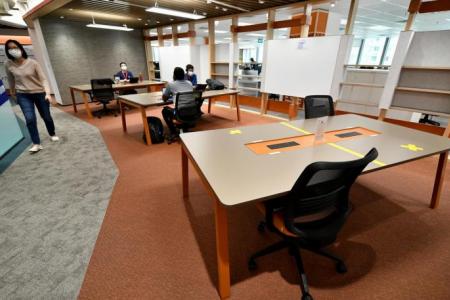Flexible work arrangements should be a permanent feature: Tripartite statement
Employers are encouraged to continue offering flexible work arrangements to employees even though all workers can now return to their offices, a tripartite statement on Friday (April 22) said.
Even as workplace Covid-19 measures were relaxed on Friday, the Ministry of Manpower (MOM), the National Trades Union Congress (NTUC) and the Singapore National Employers Federation (SNEF) called for practices such as working from home and staggered hours at the workplace to be made permanent features.
They said continuing with these work policies can help companies attract talent and help employers tap a larger pool of manpower, some of whom may need some time to take care of their dependants.
Measures such as ad hoc time off and part-time work can also be considered for front-line workers who are unable to work remotely so that they can also balance personal or family responsibilities with work requirements.
The Government said on Friday that all workers can now return to the workplace, an increase from the current limit of 75 per cent of those who can work from home.
Companies can also make their own decisions on workforce vaccination measures, where previous requirements permitted only those who are vaccinated to return to their workplace.
MOM is expected to provide more details in due course.
The statement from MOM, NTUC and SNEF read: "Globally, employers increasingly embrace flexible work arrangements as part of the future of work. Flexible work arrangements help employees achieve better work-life harmony and promote a more engaged and productive workforce.
"This in turn benefits employers. Employers should regularly engage with employees in deciding on the flexible work arrangements that best suit business and work-life needs."
The tripartite partners suggested that jobs should be redesigned where needed so more employees can work remotely.
Those who work from home must also still be appraised and remunerated fairly and objectively.
"Trust should be maintained between employers and employees, through regular and open communication to discuss what flexible work arrangements are practical and sustainable," they said.
"Employees should use flexible work arrangements responsibly and ensure continued work productivity. Flexible work arrangements are not an entitlement and the requirements of the job take precedence."
The public sector will take the lead by continuing with hybrid work so that those in eligible job roles will still be allowed to work from home for an average of two days a week.
There are several ways to do this, the tripartite partners said, including requiring employees to report to the office for meetings while allowing other work to be done off-site. Employers can also consider using more satellite offices or co-working spaces so that their workers can work closer to home.
The authorities are currently developing a set of guidelines for flexible work arrangements, which will be put out by 2024 after stakeholders are consulted.
Employers, union leaders, human resource professionals and others are also being roped in as work-life ambassadors to continue championing work-life practices at their workplaces.
Get The New Paper on your phone with the free TNP app. Download from the Apple App Store or Google Play Store now

